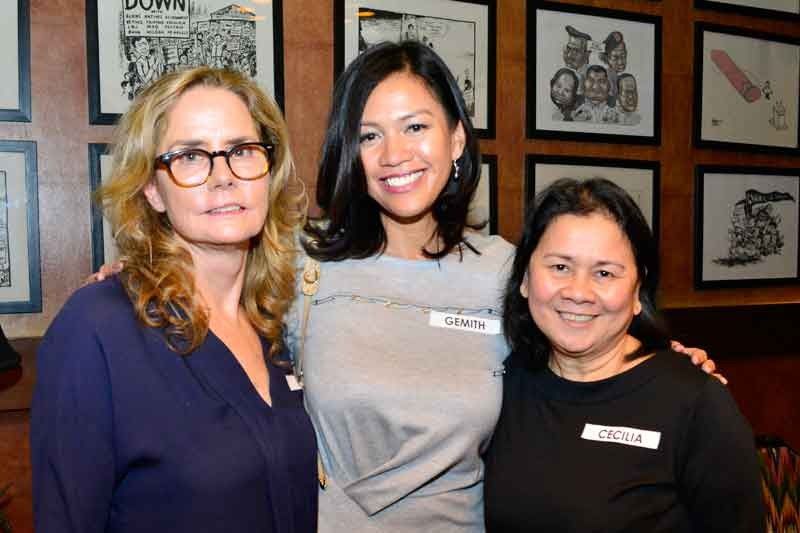Katie Ford on why we should talk about human trafficking

New York City-based Ford Models is famous for launching the careers of Dovima and Dorian Leigh, instrumental in putting a face to the ’60s swingers like Jean Shrimpton, and solidifying the ’80s supers Naomi Campbell and Christy Turlington — among many other game-changing moves like elevating the Filipina model to a global stage with 2005 Ford Supermodel of the World Charo Ronquillo and, last year, signing the first transgender model Andreja Pejic. Founders Eileen and Gerard Ford also helped transform how modeling agencies work today. When they started in 1946, models weren’t being paid; their daughter Katie compares it to how the broker system works today. But the Fords thought it was natural to protect their talents — which turned out to be a good business move on both ends and has been the standard ever since. Katie took over the business in 1995 and guided models from 50 countries, all young, vulnerable and some unable to speak English, who lived in their model house in New York City until she sold the family business in 2007.
Katie thought, when she founded Freedom For All in 2011, what if human rights violations can be solved in the same way that Ford Models developed people?
“The models came with the dream of having better income and in some cases stardom but many people do travel abroad for work with the dream of providing a better life for themselves and their family. When they are trafficked, they have the same hope. Many people are being duped with the promise of becoming models but they are forced into brothels,” the younger Ford shares during a recent charity talk in Manila hosted by advocate Gemith G. Gemparo, airline pilot and former Ford model in Paris and New York City. Speaking on behalf of her organization Freedom For All, Ford says, “For (the traffickers) a person is a thing. When I first learned about trafficking, it was the third and now it’s the second largest crime after drug trafficking and before arms trafficking. There are 40 million today in modern-day slavery. They are forced to work without pay under the threat of violence and unable to walk away.”
Ten years ago, Ford used the international search for Supermodel of the World to highlight local anti-trafficking organizations and that was how she met Cecilia Oebanda, director of the local non-government organization Visayan Forum Foundation, now called Voice of the Free.
Ford creates innovative solutions to end human trafficking in six countries (the Philippines is one of them), and Oebanda does the same thing on a local scale. “She started with women who were duped as domestic workers but it evolved to women and children being used for sex, and now they are dealing with cyber sex. Men from around the world can order a man here to torture the children. Some of the rescued children who are now in the shelter are one year olds, rescued from cyber sex. I’ve watched the children in the Center for Hope shelter grow up, receiving jobs training as they get ready to leave the shelter. I’ve seen traffickers threaten Cecilia by tearing down the door of the shelter. They use legal means like the Internet to malign Cecilia because she is interrupting their economic model.”
Ford has received personal calls for help, like an email from a college graduate from Cameroon pursuing a degree in Norway but was lied to by a corrupt labor broker to teach English in Kuwait and instead became an unpaid and abused domestic worker. (She has escaped and is being protected.) The cause is a lot to handle for the cause’s global ambassador and for Oebanda; the first step is to open up the conversation. “There are a lot of instances historically that people found it difficult to talk about AIDS and domestic abuse,” she compares.
The conversation extends to the young. IFight is Voice of the Free’s youth-oriented arm, giving conventions in schools throughout the country to help the young identify trafficking and how to report it. In the private sector, ICTSI and Philippine Airlines security are doing their part by tracking trafficked individuals, catching the traffickers and preventing them from being able to flee the country. “Every time there’s a natural disaster or war, there’s a spike in human trafficking. During Yolanda, we rescued 30 girls in Northern Samar on their way and 12 already in Villamor Airbase. Sometimes traffickers are faster than relief goods,” Oebanda recalls.
We can all do our part in preventing it. Ford says, “Women who are traveling abroad for work should look upon their government website for brokers and participate in the actual system that is there in place to protect them. That is one of the few ways you can get protection. Your government has it.”
She adds, “Boys should know those girls aren’t there willingly. Even older women aren’t there willingly. Would you want your sister to be there beaten up and forced into it? If they think the girls there are having fun, it’s because they are drugged or they’ll get killed if they don’t pretend. Boys need to start thinking that way.”
* * *
Visit freedomforall.org and visayanforum.org.



















